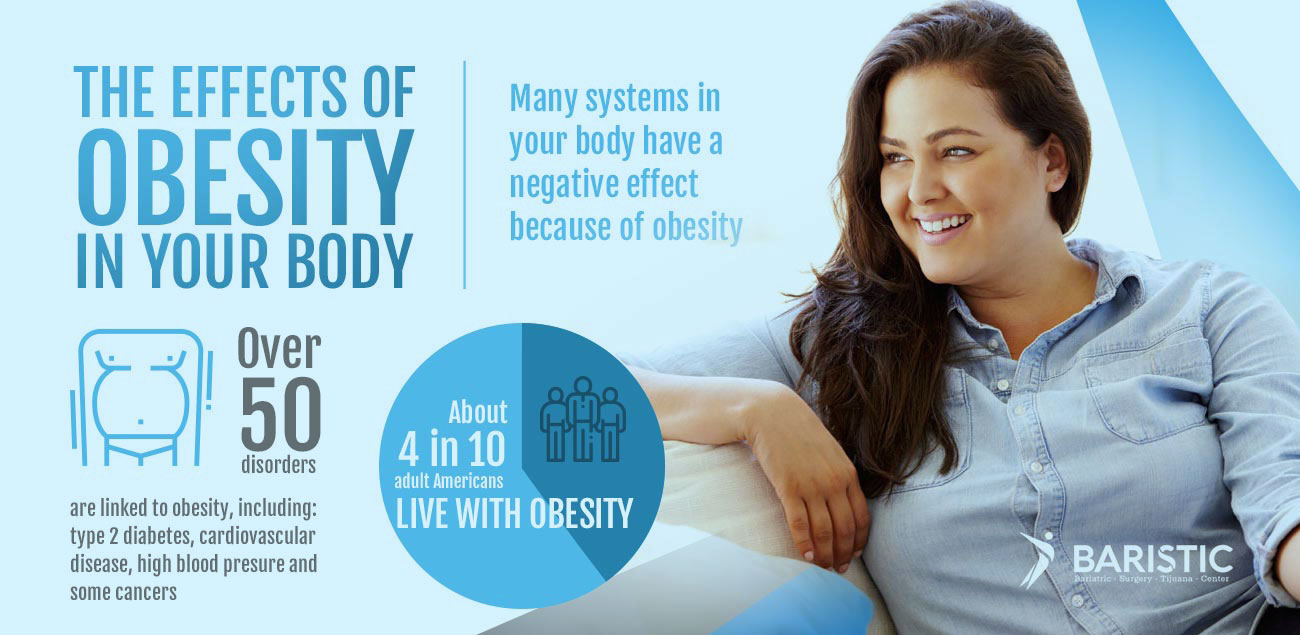
Obesity is a serious health condition that can interfere with basic physical functions such as breathing or walking. Obesity affects millions of individuals who often struggle with the effects of being severely overweight and finding effective and lasting weight loss options.
More extreme than being overweight, obesity is a medical condition that occurs when excess body fat has accumulated to the extent that it may negatively impact the health of the individual. Obesity can be caused by a variety of factors and often leads to the development of many other serious health problems and reduced life expectancy.
Using Body Mass Index to Diagnose Obesity
Obesity is usually determined by calculating a person’s body mass index (BMI), a measurement based upon height and weight. It measures the amount of weight in relation to the height of the individual.
- BMI < 18.5: Underweight
- 18.5 – 24.9: Desirable Weight
- 25.0 – 29.9: Overweight
- 30.0 – 39.9: Obesity
- 40.0 – 49.9: Clinically Severe Obesity (Morbid Obesity)
- BMI > 50.0: Super Obesity
Morbid Obesity
Morbid obesity is often accompanied by high blood pressure, diabetes, degenerative arthritis, increased cancer risk, and heart attacks. The death rate of severely obese people in every age group is about ten times higher.
For severely obese patients, their quality of life is threatened by things that are taken for granted, such as moving about easily or comfortably. Many times, obesity can also impact a patient’s self-esteem and self-confidence.
If nutrition therapy, exercise, and behavior modification cannot successfully reduce weight in a person suffering from morbid obesity, bariatric surgical procedures such as gastric bypass, sleeve gastrectomy, and adjustable gastric banding should be seriously considered.
For those who are morbidly obese, weight loss surgery can be used to dramatically improve your health and your quality of life.
Common Obesity-Related Conditions
Obesity-related health conditions reduce life expectancy. Here are some of the more common conditions. If you would like more information, please speak with your physician.
- Type 2 diabetes. People who are obese become resistant to insulin, which regulates blood sugar levels. They end up with high blood sugar, which causes Type 2 diabetes.
- High blood pressure/heart disease. The heart doesn’t work right when the body is carrying around excess weight. So, the obese person usually gets hypertension (high blood pressure), which leads to strokes and damages the heart and kidneys.
- Osteoarthritis of weight-bearing joints. Additional weight placed on joints—especially knees and hips—causes rapid wear and tear, along with pain and inflammation. Similarly, the strain on bones and muscles in the back leads to disk problems, pain, and decreased mobility.
- Sleep apnea/respiratory problems. Fat deposits in the tongue and neck can block air passages, especially in patients who sleep on their backs. This causes them to lose sleep and results in daytime drowsiness and headaches.
- Gastroesophageal reflux disease (hiatal hernia and heartburn). Excess weight weakens and overloads the valve at the top of the stomach, which then allows stomach acid to escape into the esophagus. This is called gastroesophageal reflux, and “heartburn” and acid indigestion are common symptoms. Approximately 10-15% of patients with even mild heartburn develop Barrett’s esophagus, which is a pre-malignant change in the lining membrane and a cause of esophageal cancer.
- Depression. People who are obese must deal with constant, depressing emotional challenges: failed diets, disapproval from family and friends, remarks from strangers. Plus, they often experience discrimination and cannot fit comfortably in public places.
- Infertility. Obesity wreaks havoc with male and female hormones, disrupting normal cycles and function, and leading to difficulty or inability to conceive.
- Urinary stress incontinence. A large, heavy abdomen relaxes pelvic muscles, compounding the effects of childbirth. This weakens the valve on the urinary bladder, allowing leakage when coughing, sneezing, or laughing.


